|
|
|
Sort Order |
|
|
|
Items / Page
|
|
|
|
|
|
|
| Srl | Item |
| 1 |
ID:
126114
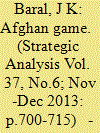

|
|
|
|
|
| Publication |
2013.
|
| Summary/Abstract |
In Afghanistan, the third Great Game is still on. The end of US-NATO combat operations in Afghanistan by the end of 2014 will be read by many as 'Obama's Vietnam', but the retention of a small number of troops and several military facilities by the US in that country will be a source of worry for countries such as Russia, Iran and Pakistan who are concerned about US motives and moves in regard to the region, especially Central Asia's energy resources which are already a target of international competition. India and Pakistan, who suspect each other's motives in regard to Afghanistan, can significantly help it to achieve peace and development by pursuing a cooperative strategy. Their attitudes towards Afghanistan seem to be experiencing a positive change warranting mutual understanding and cooperation.
|
|
|
|
|
|
|
|
|
|
|
|
|
|
|
|
| 2 |
ID:
126112
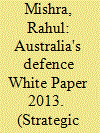

|
|
|
|
|
| Publication |
2013.
|
| Summary/Abstract |
On 3 May 2013, Australia's former Prime Minister Julia Gillard released the Defence White Paper (DWP) 2013, making it the sixth White Paper on defence in the history of Australia, and the third since 2000. The last Defence White Paper, entitled Defending Australia in the Asia Pacific Century: Force 2030, was released in 2009 when Prime Minister Kevin Rudd was serving his first term.
Seemingly, the DWP 2013 is Australia's roadmap on matters of national security, defence and security policy and priorities. Highlighting the significance of DWPs for Australia, the Department of Defence of Australia notes:
The Defence White Papers are the government's principal policy direction to the Department of Defence. They present long-term strategic direction, government commitments, and future capability requirements. Within the Department, the White Papers inform the development of more detailed planning, capability, workforce, preparedness, and financial guidance.
|
|
|
|
|
|
|
|
|
|
|
|
|
|
|
|
| 3 |
ID:
126110
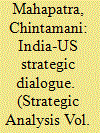

|
|
|
|
|
| Publication |
2013.
|
| Summary/Abstract |
India-US strategic dialogue was initiated in 2009, and is organised annually in different capitals. The first round of dialogue took place against the backdrop of pessimism in the bilateral relationship. For about six months after the new Obama administration was formed, strategists in Delhi were suspicious about the durability of an India-US strategic partnership that had been painstakingly nurtured by President George W. Bush and Indian Prime Minister Manmohan Singh.
The India-US defence framework agreement signed in 2005 and the US-India civil nuclear cooperation agreement concluded in 2008 were the two most significant pillars of this 'strategic partnership'. These two agreements qualitatively transformed the paradigm of India-US relations prevalent during the Cold War. The defence framework agreement facilitated defence and security relations between the two countries, which had been strained during the Cold War. The strategy that essentially obstructed strategic cooperation between the US and India, namely the US non-proliferation policy, was done away with by the civil nuclear agreement.
|
|
|
|
|
|
|
|
|
|
|
|
|
|
|
|
| 4 |
ID:
126116


|
|
|
|
|
| Publication |
2013.
|
| Summary/Abstract |
The United Nations (UN) peacekeeping 'Capstone doctrine' is the first attempt by the Department of Peacekeeping Operations/Department of Field Support (DPKO/DFS) to formulate a coherent doctrine for peacekeeping/peacebuilding missions beyond Boutros-Ghali's An Agenda for Peace and the Brahimi Report, which set out a very general approach as opposed to a doctrinal mandate. In the document, the UN lays down a framework for approaching peace operations, and also defines contemporary UN peacekeeping operations. While this document is designed, by and large, as a guide for UN personnel, it is appropriate to evaluate it to determine whether or not Capstone is consistent with theoretical literature. Furthermore, this article will assess how various components of the doctrine are derived from previous experiences. Lastly, this article will discuss how far the Capstone doctrine is consistent with the major paradigms of international relations theory, and will argue that the doctrine reflects the liberal and constructivist paradigms of international relations theory.
|
|
|
|
|
|
|
|
|
|
|
|
|
|
|
|
| 5 |
ID:
126119
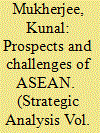

|
|
|
|
|
| Publication |
2013.
|
| Summary/Abstract |
Regionalism has been an important force in international relations since 1945. The aim of this article is to make an assessment of one of the major regional organisations from the Asia Pacific, the ASEAN, or Association of South East Asian Nations. The article attempts to give readers an overview of the problems and prospects of the ASEAN. Although the ASEAN has been successful to a large extent as a regional body, regionalism in South East Asia has been considerably undermined by a number of factors since its creation in 1967. However, in the final analysis, it has been argued that with increasing democratising tendencies in the region and with increasing economic liberalisation, the ASEAN seems to have a bright future.
|
|
|
|
|
|
|
|
|
|
|
|
|
|
|
|
| 6 |
ID:
126111


|
|
|
|
|
| Publication |
2013.
|
| Summary/Abstract |
The Arctic is beginning to test the stage-managed optics of China and Russia's 'strategic partnership'. Friction was most recently on display after the Arctic Council's May 2013 decision to confer permanent observer status on Beijing. The Chinese media celebrated the move as an affirmation of the nation's 'legitimate rights' in Arctic affairs.1 Russian officials were much less enthusiastic. Following the decision, Russian Prime Minister Dmitry Medvedev quickly reminded China that 'Arctic states lay down the rules here'.2 In fact, Russia was the primary force in obstructing China's observer status application for nearly seven years. It was only after considerable pressure from Nordic nations and a 2011 change, which required new observers to 'recognize Arctic states' sovereignty, sovereign rights and jurisdiction in the Arctic', that Moscow reluctantly approved the move.3 Interestingly, Russia is ostensibly China's strongest partner in the eight-member Arctic Council. The observer status episode revealed a rare fracture in a relationship which both sides have taken great care to cultivate as trouble-free. Indeed, recent Sino-Russian policy synchronisation on Syria and Iran, among other issues, has led Richard Weitz to assert that bilateral relations between Russia and China are at an all time high.4 However, Arctic climate change presents a challenge for these bilateral relations. Long-suppressed disagreements concerning access to sea lanes, fisheries and energy resources are quickly gaining practical application as sea ice cover diminishes. This article examines Sino-Russian interaction in the Arctic and concludes that, notwithstanding present differences, several factors suggest that cooperation will prevail.
|
|
|
|
|
|
|
|
|
|
|
|
|
|
|
|
| 7 |
ID:
126115
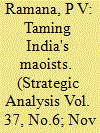

|
|
|
|
|
| Publication |
2013.
|
| Summary/Abstract |
This article seeks to make a preliminary assessment of the surrender and rehabilitation policy being adopted towards Naxalites. The examples/experiences cited in this paper refer largely to cadres and leaders of Communist Party of India (Maoist), or CPI (Maoist). It is part of a multi-pronged conflict management and resolution strategy and is required to be implemented along with firm action by police against those who follow the path of violence. This article argues that (a) the various affected states should evince interest to obtain surrenders; (b) put in place a robust surrender and rehabilitation policy, preferably at the national level; (c) secure surrenders on a case-by-case basis; (d) intensify security operations; and (e) policy implementation should be effective and closely monitored.
|
|
|
|
|
|
|
|
|
|
|
|
|
|
|
|
| 8 |
ID:
126113
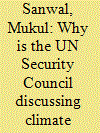

|
|
|
|
|
| Publication |
2013.
|
| Summary/Abstract |
The G8, Pakistan and the Pacific island states have pushed for a discussion in the United Nations (UN) Security Council on the security dimensions of climate change. As the issue gains momentum at the global and regional levels, India as an emerging power that continues to use energy and other natural resources, at the cost of stressing other countries, particularly its neighbours, will need to formulate a response.
In South Asia, sharing water resources and adverse effects of climate change are inter-related with respect to their impact at the national level, and the resulting diplomatic tensions will be shaped by the way the issue is framed at the global level.
|
|
|
|
|
|
|
|
|
|
|
|
|
|
|
|
| 9 |
ID:
126109
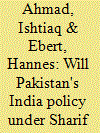

|
|
|
|
|
| Publication |
2013.
|
| Summary/Abstract |
The May 2013 parliamentary elections in Pakistan led to a stable government under the Pakistan Muslim League-Nawaz (PML-N). Prime Minister Sharif promised a shift of the country's India policy. Given his track record, the current pressing economic and security imperatives and recent improvements in Indo-Pakistan trade relations, the popular optimism is understandable and the first steps of rapprochement are to be expected. But structural factors such as growing asymmetries, the persistent role of the army in Pakistan's India policy and the rigid discourse of ideology undermine the potential for meaningful change. While a paradigm shift is therefore unlikely in the foreseeable future, a rare window of opportunity has opened for the new leadership to assert its authority and incrementally enhance new policies.
|
|
|
|
|
|
|
|
|
|
|
|
|
|
|
|
|
|
|
|
|